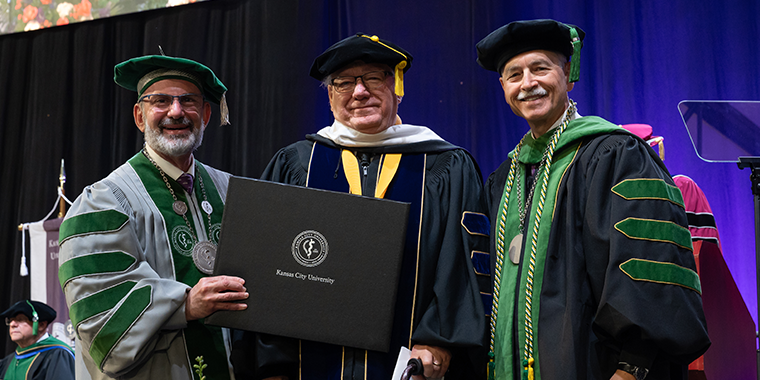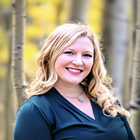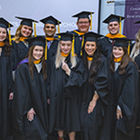When Robert White, PhD, became dean of Kansas City University’s (KCU) College of Biosciences (COB) in 2014, the program enrolled fewer than 40 students. A decade later, more than 600 COB graduates have moved on to medical, dental and other advanced degree programs — many of them crediting White’s steady leadership and encouragement as a pivotal part of their journey.
Now transitioning to serve as director of KCU’s master’s program, he leaves behind a legacy defined by academic growth, scientific inquiry and a deeply personal commitment to student success.
Long before his arrival at KCU, White built a research career that took him from Jackson Laboratory in Bar Harbor, Maine, to Harvard Medical School and eventually to Children’s Mercy Hospital in Kansas City, where he ran a DNA diagnostic lab and chaired the institutional review board. His research focused on hematology and genetics, including discoveries in human retinal dystrophin that could hold promise for advancing treatment of Duchenne muscular dystrophy (DMD).
“I’ve always loved research,” he said. “It’s like peeling an onion. There’s this mystery, and you just keep peeling away until it turns out to be something different.”
His presentations on DMD and gene editing have drawn standing-room-only crowds, including recent lectures at Evangel University where he explored the promise and ethical complexity of CRISPR technology—a groundbreaking gene-editing tool that allows scientists to cut and repair DNA with remarkable precision. The same subjects that capture attention in the lecture hall continue to drive his work in the lab. He is currently continuing research into DMD and hemochromatosis, with support from BioNexus KC, and now looks forward to dedicating more time to the lab in his new role.
White didn’t originally set out to become a dean. When he joined KCU in 2010, his plan was to focus on teaching, advising students and continuing his research. But he soon found himself drawn to academic leadership.
“I decided I wanted to become dean because I felt I could make a difference,” he said. “I thought, maybe I can lead a team of faculty, support our students and help them get to that next step in their careers.”
White brought a clear vision to his leadership — one centered on access, mentorship and long-term impact. He worked to remove barriers for students, expand opportunities for research and career readiness, and cultivate a culture of support within the College.
“My goal was always to help students move forward,” he said. “Whether that meant getting into medical school, dental school, a PhD program or finding a meaningful career in science — I wanted to make sure they knew what was possible and how to get there.”
White’s deep care for students is rooted in personal loss. In 2008, his son passed away unexpectedly at the age of 23 due to undiagnosed heart failure. The loss profoundly shaped the way he approaches mentorship and student support.
“Being the dean has always felt a bit like being a dad,” he said. “At the end of every academic year, I tell the students: you’ve given me a gift. I’m the father of two, but you’ve made me feel like the father of many.”
That sentiment was echoed back to him when students surprised him with heartfelt letters of gratitude—personal notes of thanks and reflection on the impact he had on their lives. “My wife and I read the book together,” he said. “It brought tears to our eyes. To hear that from the students — it’s priceless.”
In recognition of his extraordinary service to the University, KCU presented White with an honorary degree during commencement ceremonies for the Class of 2025.
“I’ve been on cloud nine ever since,” he said. “But I also felt like there should have been 200 people behind me during that hooding. This wasn’t just about me — it was about everyone who helped build the College of Biosciences into what it is today.”
White will remain a familiar presence at KCU — continuing to teach, advise and mentor the next generation of scientists. But with fewer administrative responsibilities, he’s looking forward to having more time for the things that matter most.
“I’ll be teaching more, doing more research and spending more time with students in the lab,” he said. “They’ve always told me they wish I lectured more. Now I can.”
Outside of KCU, White and his wife, Kathy, are preparing for a move to a new home and planning future visits to Boston to see family — and, as longtime Disney fans, possibly a trip back to Walt Disney World. “She’s been my rock through all of this,” he said. “I couldn’t have done any of it without her.”
As for his advice to those considering academic leadership, White keeps it simple. “Be present. Give students hope. And believe in them — because when someone believes in you, you can do just about anything.”

_20230821142904_0.png?w=140&h=140)


(0) Comments